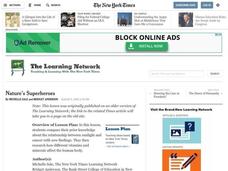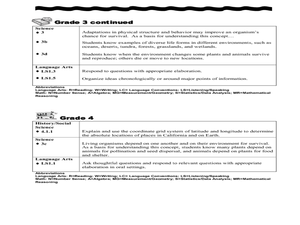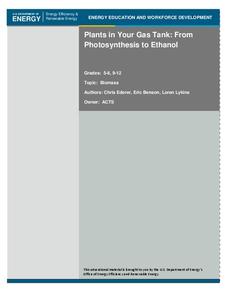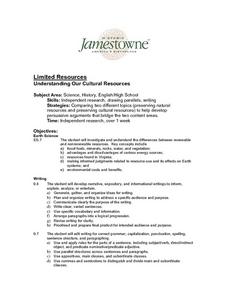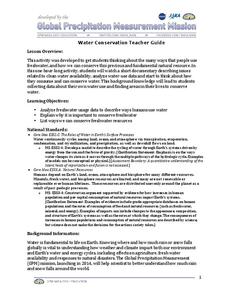Curated OER
This Mine of Mine
Students explore natural resources by conducting a geology experiment in class. In this mineral mining lesson, students discuss the types of geological material that can be found when mining and the uses for these resources such as coal....
Curated OER
Nature's Superheroes
Students compare their prior knowledge about the relationship between sunlight and cancer with new findings. They research how different vitamins and minerals affect the human body.
Bonneville
Informative Writing: Where Does Energy Come From?
Get energized about all the different sources of energy. A research project has scholars investigate a renewable or non-renewable energy type of their choice. They write a report on their findings and decide on a way to publish their work.
Curated OER
Earth Pockets
Students identify the Earth's natural resources. In this Earth science lesson, students read the book The Great Kapok Tree and discuss types of natural resources. Students use categories such as wood, paper, and trees and list items that...
Curated OER
Paper or Plastic: Exploring Renewable Resources.
Learners discuss, develop, invent, and implement a plan for making informed personal economic decisions about renewable resources.
Curated OER
Salmon Vs. Dams: the Dam Removal Debate on the Elwha River
Students role-play a meeting of the Elwha River council in which they present opposing views to council members on hydroelectric power and salmon fisheries resources. They brainstorm possible conflicts between various people in land-use...
National Renewable Energy Laboratory
Biomass: Biogas Generator
It's a gas. Middle schoolers build a biogas generator following the directions in this resource. After a few days of observation, they demonstrate that the gas given off by the decomposing manure is flammable. The activity concludes as...
Carnegie Mellon University
How Power Plants Work 1
First of three lessons, this is a great start to a unit on energy. As you demonstrate, learners discover different types of energy and how it is converted from one form to another. They then focus in on the generation of electricity by...
Curated OER
Plants in Your Gas Tank: From Photosynthesis to Ethanol
Explore ethanol and how it is produced. Young scientists investigate photosynthesis and fermentation to the concept of conservation of energy and mass. They discuss the environmental and economical benefits of ethanol as a fuel additive.
Curated OER
The Appliance Explosion
Students explain why the number of appliances used today differs greatly from the number used previously. They construct a bar graph to show changes in appliance use over a period of time. They also list appliances that could be eliminated.
Curated OER
Thinking about Energy
Students examine their understandings about energy concepts by completing an online survey. Students participate in a class discussion about their uses of resources and the differences between perpetual, renewable, and nonrenewable...
Curated OER
Energy: The Universal Currency
Science stars examine the concept of energy by thinking about everyday situations. The lesson plan is incohesive. It lists goals for the student, but doesn't address all of them in the content. The best use of this resource would simply...
Curated OER
Limited Resources - Understanding Our Cultural Resources
Pupils examine and compare preserving natural resources and preserving cultural resources. They conduct Internet research on two topics, and write a position paper on whether cultural resources or natural resources are more important to...
Curated OER
The Chemistry of Refining Crude Oil
Consider our energy sources: wood, coal, oil, uranium. Learners compare the pollution to energy produced for each. They practice fractional distillation of an alcohol/water mixture to simulate the process of refining crude oil....
Curated OER
Water Conservation
Open learners' eyes to the challenge of finding safe drinking water – something we often take for granted in our country. The PowerPoint presentation includes images, graphs, diagrams, and even a video to stimulate discussion on how we...
It's About Time
Petroleum and Your Community
I was going to write a joke about oil, but it seemed crude. This lesson starts with a comparison of where the US gets oil from and how that has changed over time. After analyzing the data, scholars create a graph and use the Internet to...
Curated OER
Does Mother Nature Know Best?
Investigate herbal medicine in the science or health classroom with this instructional activity from the New York Times. After a discussion about class members beliefs about and experiences with herbal medicines, pupils read an...
PricewaterhouseCoopers
Waste and Recycling: Recycling and Energy Recovery
Reduce, reuse, recycle, and recover. Young environmentalists learn about the overwhelming amount of garbage produced and discover better ways to minimize their impact on Earth by learning the difference between garbage and...
Curated OER
Urban Ecosystems 4: Metabolism of Urban Ecosystems
Learners discover that material and energy uses by a city come from outside the city boundaries. They realize that the pathway of these material is linear instead of cyclical as they are in natural ecosystems.
Virginia Department of Education
The Cycles of Nature
Encourage peer collaboration and assist with the creation of visual aids to identify carbon, water, and nitrogen cycles as your class learns more about nature. They discuss relative information, create a visual aid...
Carnegie Mellon University
Transportation
Teach your environmental studies, life science, or engineering class how an internal combustion engine works using the first few slides of the accompanying presentation. Then, focus in on the resulting carbon emissions. Finally, take a...
Curated OER
Solar Sweet Tea
Students study the sun. For this heat energy lesson, students use the sun's warmth to make tea. They place a few jars with tea bags and water in the sun and discuss what the sun is doing to the water while they wait for the tea to brew....
It's About Time
What Drives the Plates?
It's getting hot in here! Lead your emerging geoscientists on a thrilling journey as they calculate liquid densities to determine forces that stimulate thermal plates from within the earth's crust. They explore effects of temperature on...
Curated OER
Simple Everyday Products
Fourth graders investigate the origin of products and how they are manufactured from natural resources. They draw the production cycle and discuss how one could help reduce the number of natural resources that are used. They also...



